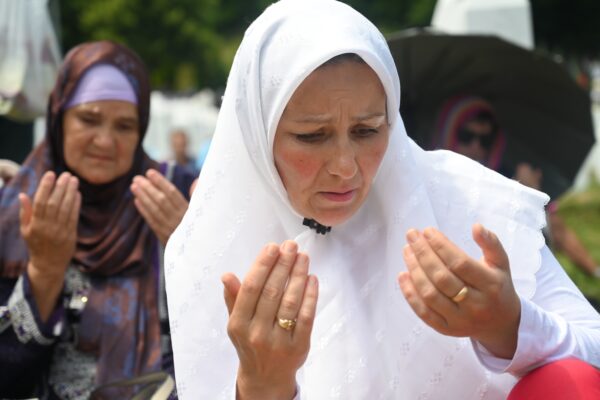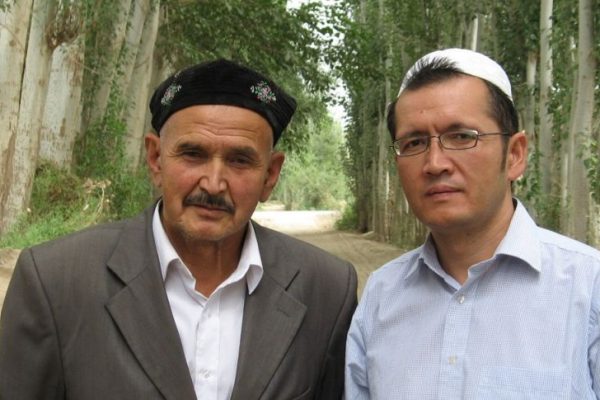History is not a chapter of the past – history is alive and we are acting in the history that will be told to future generations. Srebrenica and Xinjiang are bleeding at the same time – and if Srebrenica taught us anything, it is to not remain silent in the face of injustice.
History is not a chapter of the past – history is alive and we are acting in the history that will be told to future generations. Srebrenica and Xinjiang are bleeding at the same time – and if Srebrenica taught us anything, it is to not remain silent in the face of injustice.
This week marks 26 years since the horrifying genocide of Bosnian Muslims in Srebrenica. On June 11th, 1995, in the aftermath of the bloody breakup of the former Yugoslavian state, Bosnian Serb soldiers entered the town of Srebrenica and systematically murdered at least 8,372 Bosnian Muslim boys and men.
The numbers and statistics around the mass killings only shed a small light on the horrors of this genocide: the youngest victim shot to death was only a little over three months old, while the oldest victim was around 106 years old. More than 30,000 Bosnian women and girls were forced to flee the city – and thousands were systematically raped as part of the ethnic cleansing. The bodies of those killed in Srebrenica were thrown into mass graves.
This blatant example of ethnic cleansing was clearly a genocide – orchestrated by those in power to eliminate a specific group of people because of ethnic and religious identities and to ensure a Serb-dominated nation-state. Now often labeled as the worst mass killing on European soil since WWII, the Srebrenica massacre was eventually ruled by the International Court of Justice as an act of genocide – but the silence of the international community and of the UN while the genocide was being systematically carried out still remains a painful part of this atrocious time in Bosnian history.
Powerful countries such as the US, backed by the ineptitude of the UN, remained silent while thousands of Bosnian Muslims suffered and died under the systematic genocide being conducted – and while many of the military leaders who participated and acted out the genocide were eventually tried in the ICC, many commanders and military leaders fled to Serbia, where they live in impunity and are even celebrated by far-right nationalists.
In a 1999 UN official report by the then Secretary-General Kofi Annan, he stated:
Through error, misjudgement and inability to recognize the scope of the evil confronting us, we failed to do our part to help save the people of Srebrenica from the Serb campaign on mass murder.”
While the UN only after the mass killings were willing to label this atrocity as a genocide, many governments around the world continue to hesitate when simply using the word genocide – the 1948 Convention on the Prevention and Punishment of the Crime of Genocide requires all signatories to prevent and punish acts of genocide in both war and peacetime, with genocide defined as “acts committed with intent to destroy, in whole or in part, a national, ethnical, racial or religious group”. These acts include killing members of the targeted group, causing serious bodily or mental harm to the targeted group, deliberately inflicting on the group serious harm to bring about its physical destruction, imposing measures intended to prevent births within the group, and forcibly transferring children of the group to another group.
Once a nation-state recognizes an act of genocide, they are required to act upon it – meaning that powerful countries around the world hesitate as they calculate their own gains and losses in getting involved in preventing and punishing another nation-state or government for an act of genocide.
Realpolitik, the system of international politics based on practical rather than moral considerations, is not just a philosophical approach of realism – it dominates our international community of nation-states. With countries calculating their own losses and gains when labeling something as genocide, we have already lost the fight against injustice before it even begins. The failure of the international community when it came to the Bosnian genocide should have empowered communities around the world to reconsider how and who we vote for, and how we hold our governments to account on the issues that matter.
But did anything change in the 26 years since Srebrenica?
Today, Uyghur Muslims in China’s northwestern province of Xinjiang are being systematically tortured, killed, and controlled in an effort to culturally and physically eradicate this specific group of peoples – it cannot be denied that China is actively pursuing a course of blatant genocide directed at the Uyghur and other ethnic minority Muslims of northwestern China.
Up to 2 million Uyghurs and ethnic minority Muslims are being held in concentration camps across the province of Xinjiang, in what experts are calling the largest mass incarcerations of peoples since the Holocaust of WWII. If Srebrenica was the worst mass killing on European soil since WWII, China’s genocide of Uyghur Muslims is one of the worst mass incarcerations of people since WWII as well.
Outside of the millions being held arbitrarily in concentration camps, Uyghur Muslims live in a constant state of control, torture, and fear under the watchful eye of Chinese President Xi Jinping’s government. Uyghur Muslims are rounded up and detained if considered part of the larger threat to the state – the Chinese Communist Party in Beijing has called for a “war on terror” on what they deem to be dangerous foreign influence and terrorism from their western borders.
But being considered a threat to the state is a blatant cover for mass genocide – Uyghur Muslims are detained for things as simple as having a beard or wearing a hijab, which is seen as Islamic extremism. Those attempting to fast during the holy month of Ramadan are rounded up and either threatened with or taken to concentration camps – entire families are blackmailed and forced into submission with threats of death and torture.
Once detained in the numerous concentration camps across Xinjiang, Uyghur Muslims are killed and tortured. There has been documented evidence of mass rape and forced sterilization of women – the Chinese state is not only killing members of an ethnic group but are attempting to prevent the very continuality of the group as well. Children whose parents have been detained are taken by the Chinese government into state-run schools and orphanages – where their Uyghur identity is banned and forcibly eradicated.
Besides the physical act of genocide, China continues on its path of cultural genocide as well – the Uyghur language is banned in schools, religious symbols in mosques and even restaurants or homes are banned, and historical sites such as cemeteries are being bulldozed and destroyed in an attempt to eradicate Uyghur history and cultural identity.
China is ticking off every single act of genocide as defined in the 1948 Convention on the Prevention and Punishment of the Crime of Genocide – and what has the international community done in response to one of the most horrendous examples of human rights abuses in modern history? Not much to say the least – and the reasoning is just as morally sickening as it is deeply troubling.
The economic and strategic power of China remains alluring for most states around the world – with China’s Belt and Road Initiative, which encompasses the country’s foreign policy plans of investments and infrastructure developments in around 70 countries around the world, many countries feel wary about calling out China’s ongoing genocide. China’s Silk Road Economic Belt, which weaves through Central Asia and the Middle East, is also part of the initiative to boost economic ties and investment throughout the region.
This is, almost undoubtedly, the reason why a frightening number of Muslim-led governments from around the Middle East and North Africa co-signed a letter praising China’s continued stance towards “protecting” human rights. This letter was written in response to a handful of mostly Western European governments who called out China’s ongoing abuses towards Uyghur Muslims – cosigned by countries like Saudi Arabia, the UAE, Qatar, Bahrain, Kuwait, Oman, Algeria, Egypt, Pakistan, Somalia, and Sudan, the letter stated:
We note with appreciation that human rights are respected and protected in China in the process of counterterrorism and deradicalization.”
While small steps are being taken through the activism and awareness campaign by human rights groups and Uyghurs exiled abroad such as the World Uyghur Congress based in Germany, the international community still has a long way to go. China continues to act with impunity, and Uyghur Muslims are still being tortured, detained, and killed in a state-sponsored act of genocide.
We must not let another 25 years go by, in which we look back with a touch of sadness and recall the Uyghur genocide that was so brutally conducted with almost full inaction by the international community. If Srebrenica taught us anything, it is that the killing of innocents must not be tolerated – not only on moral grounds but on a humanistic level as well. The killing of one innocent person should raise outrage in a community, the killing of numerous innocent people should ignite a mass reevaluation in society, and the killing of an entire group of people based solely on their ethnicity or religion should create a massive outcry around the world – and yet the world remains eerily silent in the face of China’s genocide against Uyghur Muslims.
Educate yourself. Raise awareness. Instil a sense of duty in your community and get community leaders on board. Write to your politicians and organize protests and campaigns. Vote for politicians who are not afraid to call out China. Vote out politicians who are slaves to the economic and strategic allure of China’s power despite its ongoing genocide. Boycott companies and firms who work in China and are accused of using the forced labour of Uyghur Muslims held in detention. Act and act with the duty that is required of us all – for it is literally a matter of life or death for our Uyghur brothers and sisters.
Must we wait for another quarter of a century to look back and think – if only, if only we had acted in the face of the Uyghur genocide? History is not a chapter of the past – history is alive and we are acting in the history that will be told to future generations. Srebrenica and Xinjiang are bleeding at the same time – and if Srebrenica taught us anything, it is to not remain silent in the face of injustice.
Resources
The darker side of China: A brief history of the Communist state and the Uyghur Muslims
What Can Muslims In Europe Do To Help Uyghur Muslims?
How African Muslims Can Help Uyghur Muslims
Uyghur concentration camps in China may be largest mass incarceration since the Holocaust
Cultural Genocide: China Continues to Destroy Uyghur Mosques and Islamic Symbols
China destroying Uyghur burial grounds in latest move of cultural genocide
Halal shops in Beijing ordered to remove Islamic symbols in newest Islamophobic campaign by China
China accused of genocide over forced abortions, rape, and sexual torture of Uyghur women
Female Muslim prisoners in China’s concentration camps are being gang-raped and tortured
China is reportedly sterilizing Uyghur women in detention camps
China separating thousands of Muslim children from parents in newest crackdown
Newly Leaked Documents From China: Uyghurs detained for having beards, wearing hijab
Secret documents expose details of China’s concentration camps for ethnic Muslims
Muslim majority countries part of new letter defending China’s concentration camps of Uyghur Muslims





